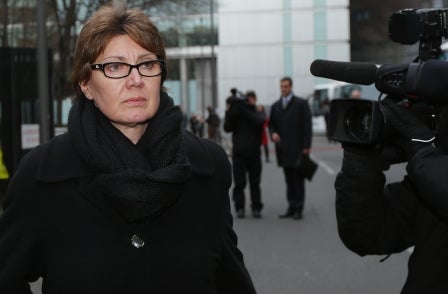
The shameful way News UK, and more recently Trinity Mirror, have thrown sources to the wolves under Operation Elveden casts a shadow over the reputation of British journalism.
Until now, Press Gazette’s main focus has been on the journalists who have been arrested and, in some cases, tried for doing what tabloid reporters have always done in this country: pay for stories.
Thankfully no journalists have (yet) been sent to prison because their employer paid public officials for stories.
But the sources (such as DCI April Casburn pictured above) have paid a far heavier price: with 26 convicted so far and 16 jailed for a total of more than 20 years.
Every journalist knows rule one of our trade is that we protect our confidential sources.
In the days after the closure of the News of the World, owner News Corp abandoned that sacred duty with devastating consequences.
The revelation in July 2011 that journalists on the News of the World had hacked the voicemails of murdered schoolgirl Milly Dowler prompted the closure of the UK’s biggest selling national newspaper in a matter of days.
There were concerns that allegations of corporate criminality could bring down News Corp.
Company lawyers responded by deciding to “drain the swamp” as they put it. They set up the Management and Standards Committee to root out any other alleged criminality in the company’s surviving titles.
The MSC quickly came across evidence The Sun had paid prison staff, police officers and other state employees for stories. This evidence was passed on to the Met Police, which set up a new inquiry to deal with it – Operation Elveden.
Insiders at News Corp say they had no choice. They were being accused of involvement in a criminal conspiracy and cover-up so had to share any new evidence of criminality with the authorities.
But with benefit of hindsight we can now see this spirit of co-operation was a huge mistake.
The sources who contacted The Sun often provided information about stories which had clear public interest: an unreported death in prison custody, a child attacked by a fox in a school playground, a convicted killer given special treatment in a jail.
We now know that unless disclosure was found to have harmed the public interest it is unlikely that the journalist broke the law (as it was then).
Police and prison officers who take cash from journalists are in different category. The law is more clear cut and in the eyes of the state they are corrupt and should be punished severely.
But corrupt or not, they are still sources and deserved protection.
The Editors’ Code states: “Journalists have a moral obligation to protect confidential sources of information.”
The fact that this rule has been so widely flouted by the UK’s biggest national newspaper publisher does not appear to be even on the radar of press regulator IPSO.
If we are ever to drag the reputation of our industry out of the post-hacking scandal mire we must give some serious consideration to what prompted News UK to sell its sources down the river. And we must take steps as an industry to stop this happening again.
This is far from an academic argument – but an urgent one. The News UK side of Operation Elveden appears to be over. But Trinity Mirror has stressed that it is co-operating fully with the Met Police as its faces investigation ahead of a possible corporate prosecution for involvement in phone-hacking and paying public officials.
On 2 June prison officer Robert Norman, 54, was jailed for 20 months after being paid £10,000 for 40 story tips by the Mirror and the News of the World. He was apparently convicted as a result of evidence supplied to the police by Trinity Mirror.
In the eyes of journalist Stephen Moyes, Norman was a genuine whistleblower “hell-bent on highlighting mismanagement, waste of taxpayers' funds and threats to his members”.
We need to take action now before more sources like Norman are sacrificed.
Otherwise why would any public sector whistlleblower ever go to a newspaper with a story again?
Email pged@pressgazette.co.uk to point out mistakes, provide story tips or send in a letter for publication on our "Letters Page" blog
